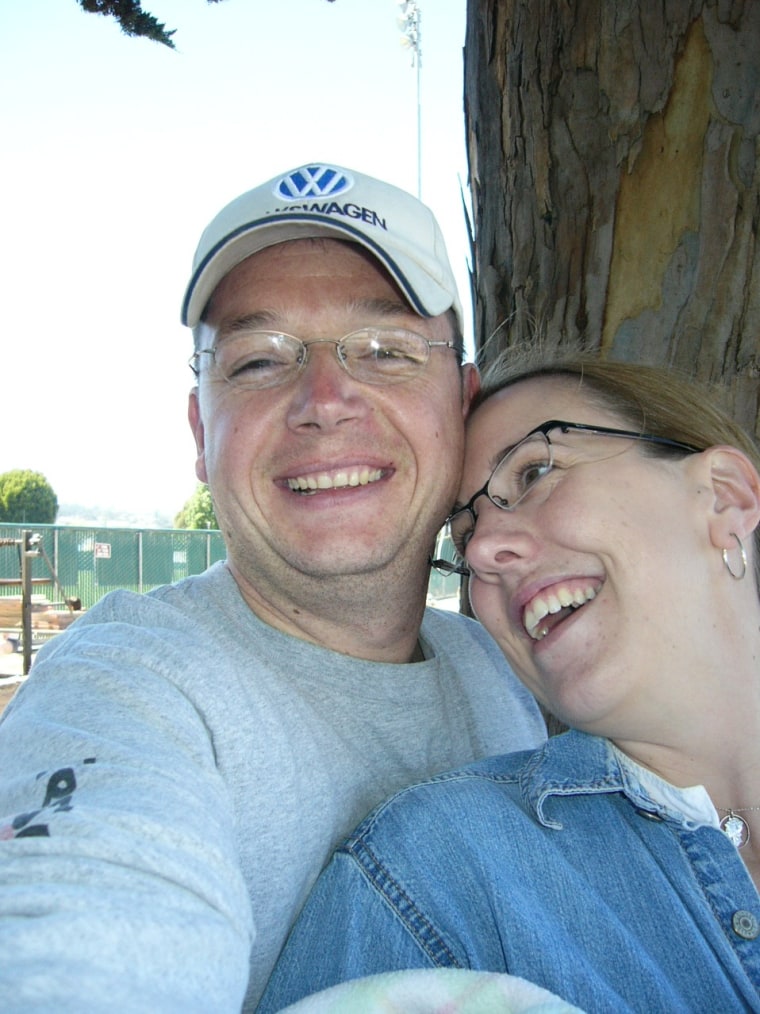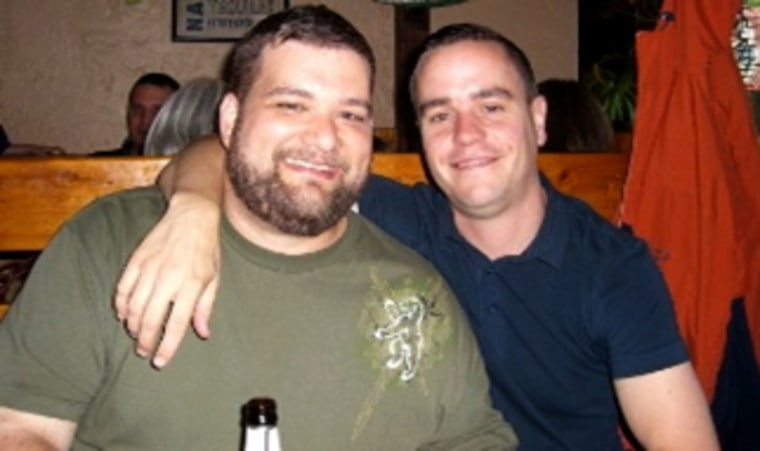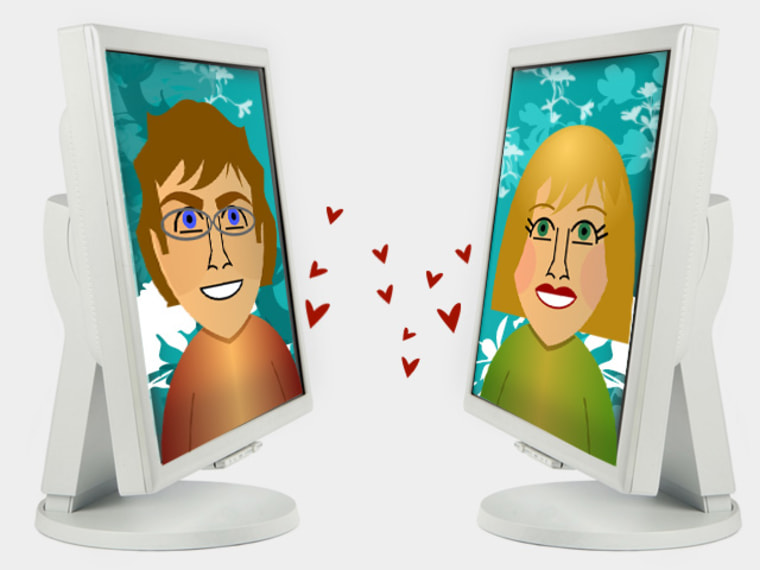My college roommate hung on to her hometown boyfriend longer than most. I remember creeping in to the apartment late at night and tripping painfully over the phone cord that snaked from the living room into her bedroom. And if I listened hard, I could hear the inane murmurings that only a long-distance relationship can produce:
“You hang up first … you didn’t hang up! I’m not going to hang up. Are you still there? I love you too!”
If you’re over 35, you can totally relate. Don’t deny it. But there’s a whole generation of Romeos and Juliets who don’t know from five-hour phone calls over long-distance wires. They’ve never even used a corded phone. For these youthful — or tech-savvy — paramours, they’d rather whisper their sweet nothings over instant messages, e-mail, Facebook or Skype.
Take Jocelyn Bessard, for instance. The stay-at-home-mom from Minneapolis met a guy in Second Life, the online world where people create avatars to represent themselves. He lived in Syracuse N.Y., but in Second Life, physical distance doesn’t matter a whit.
At first the two were just avatar pals with complementary avatar vocations — he built houses in Second Life, and she sold virtual real estate. Soon the friendship became romantic, and the couple wanted to “talk outside of being avatars,” she says. So they took their relationship to the next level: Yahoo Chat.
Initially, Bessard preferred this approach to hanging out in person. With text, “you’re forced to write, and be descriptive, and reveal more of yourself to that person than you would face to face,” she says.
Kate Canute, of Boca Raton, Fla., and her now-husband, Adam Canute, also made extensive use of instant messaging. The two had met online, and Adam lived in Melbourne, Australia, so long phone calls were not only expensive, but tough due to the time difference. The couple worked it this way: When Adam got into work in the morning, they’d log into MSN Messenger and hang out. Kate says this was more natural than a scheduled phone call.
“Having to force all that two people have to talk about over the course of a day into a 45-minute phone call would have been difficult, especially considering that we were just getting to know each other,” she says. “This way it just flowed.”
Luckily, Kate held on to those message logs. Once the two got engaged and decided to marry and live in the U.S., the couple hired an immigration lawyer. “He told us that we would need proof of our relationship over time — in pictures, letters and stuff like that.” (It must have worked — Adam was granted resident status on Feb. 17).
Digital communication can also be a boon to established relationships. Curtis Perry Jr., of Chicago, met his girlfriend while they were at the University of Florida in Gainesville. After college, the two moved apart, but were able to keep things going strong for four years using AOL Instant Messenger.

“Neither of us is really a phone person,” says Perry, adding that AIM was just easier for keeping in touch. Still, the pair did talk on the phone sometimes, “when the conversation truly needed to be heard,” he says. “That included telling each other funny stories or relaying important information.”
The phone isn’t a realistic option for Sara Jeffries Clark and her husband, Mike, an independent contractor currently working in Djibouti. Mike’s mobile phone doesn’t work in the coastal African country wedged between Somalia, Ethiopia and Eritrea. And to talk on a landline, he’d have to wait his turn for one of 10 available phones — and be limited to just 30 minutes. Instead, Mike and Sara use Skype and the chat feature on Gmail, which has video and voice capability, to stay connected.
“I don’t enjoy talking on the phone as much as I do chatting online, over Skype or GChat. Sometimes I mute the speakers and watch him type things to me,” says Clark. “It’s ridiculous sounding, but it’s so fun.”
Clark, who lives in the couple’s Grovetown, Ga. home, says communicating this way has also helped her husband stay rooted to the precious, everyday things about home. “He says the high point of his day is to see me … I’ll show him the cats, I just hung a new shade in the living room. It’s like he’s still part of the household.”
And though Clark sends an “evening wrap-up” over e-mail, she says she “couldn’t have done it without video.”
“I need to look at him and say, ‘Oh, he’s still here. He’s not gone. He’s safe and in one piece.’ He shaved off his mustache and I hate it and said, ‘You have to have that back when you come home!’” she recounts.

Steven Lloyd, 36, also used Skype to communicate with his partner, Daniel Boucher, when the two were apart. The couple met in New England during the summer of 2009, but Lloyd headed back to Phoenix, where he lives. The two knew things were serious at the end of just three months together, and Boucher planned to relocate to Phoenix from Jamaica Plain, Mass. But getting everything together took five months.
The couple discussed their move and other daily happenings on Skype, and they also used the phone, e-mail and the chat via Facebook to stay in touch. But even with all of these digital options, Lloyd admits that nothing did it for him like a good old-fashioned letter.
“There was something about the tactile feel of letters and postcards that, for me, recalled that our relationship was really rooted in time and memory as well as in love and affection. It is a feeling that was never duplicated on Skype, instant messages or phone conversations. We, in fact, both admitted that by the time Dan moved here that there was a hollowness to digital love and relationships.”
That emptiness is what eventually ended things between Bessasrd and her online lover. The two moved from Yahoo Chat to Skype, and they’d arrange online dinner dates and other things to “close the digital gap,” she says. But they never met face-to-face, and for Bessard, that was the deal-breaker.
“Every human being longs for some physical interaction with the person they love, even if it’s just a smile. You can’t get that through pixels so easily. Everything we thought we could convey through looking at a screen … something was missing. I couldn’t get a hug if I had a bad day,” she says. “Ultimately, that’s what ended it.”
Kristin Kalning is a technology and game editor at msnbc.com. She and her husband share the same address, but still send e-mails, text messages and instant messages to each other all day long.
